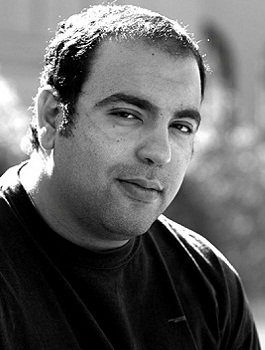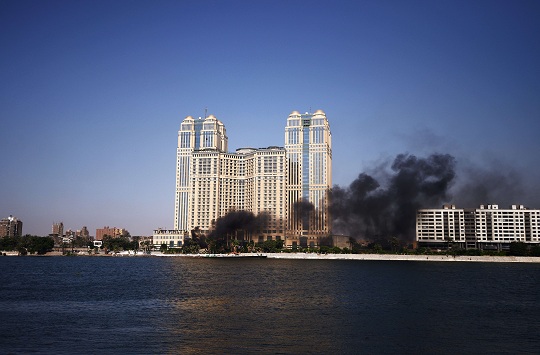
Two days ago there was an apartment on fire in a building at the Ard El Golf area in Heliopolis. It went on for 45 minutes until two of my friends, who lived in the adjacent building, called the fire department. Two minutes later, to their surprise, the fire truck arrived, only to park in front of the building, with the firefighters standing outside watching the fire and doing nothing to stop it.
Ten minutes later, two more fire trucks arrived, and instead of joining the first one in taking out the fire, their crew started fighting with the crew of the first fire truck. The civilian bystanders decided that the fight was more fun than the fire, which was sort of waning on its own, so they joined the fight as well.
So, you had three parked fire trucks, three firefighting crews fighting amongst themselves, and the concerned bystanders, all while the apartment building was still on fire.
What a perfect allegory for the state of Egypt at the moment.
There is a fire rising in Egypt, and it’s one that none of us know how to put out, or even have the necessary tools to try. The state does (or did at some point), but short-sightedness, irresponsibility and greed prompted them to not even admit that such a fire exists.
The opposition understands and points out that there is a fire, but have no ideas or solutions as to how to put it out. The people, of all political affiliations, are simply standing there, watching the fire, hoping it wouldn’t spread to their homes but knowing it will, and instead of helping, they are partaking in our new favourite national past-time: Blaming someone for it.
The blame game is fun, but it never works. Recent research shows that people who blame others for their mistakes lose status, learn less, and perform worse relative to those who own up to their mistakes (please feel free to cite whichever favourite report you’ve recently read that places Egypt in a worse ranking than it was two, thirty, forty, or sixty years ago). Groups and organisations with a rampant culture of blame have a serious disadvantage when it comes to creativity, learning, innovation, and productive risk-taking. Our entire country has that culture, and has had it for a very long time.
The simple answer would be to quit playing the blame game all together, but this is easier said than done, and some recent research has figured out the reason why: Blaming is contagious. The study, published in the Journal of Experimental Social Psychology, demonstrated that “goal contagion” is at work.
The “germ” that spreads is the goal of protecting one’s self-image. When people observe others protecting their egos, it spreads, and then, the inevitable conclusion to this: your daily conversations, your Facebook timelines and Twitter feeds becoming permanently occupied by your friends and loved ones hysterically screaming, sometimes to no one in particular, about who they blame for this mess.
Following the logic of the blame arguments, one finds out that the following groups did the unforgiveable, according to the makers of the arguments: The old regime backers are to blame for the corruption and the state of the country; the utopian revolutionaries who had no leader or realistic or informed plan are to blame for the country’s slow descent into theocracy; the police are to blame for being both corrupt torturers and murderers of the people and cowards when it comes to stopping crime; the military is to blame for abusing and killing the protesters and giving the country to the Muslim Brotherhood; the Shafiq voters are to blame for not supporting either Sabahy or Amr Moussa; the “lemon revolutionaries” are to blame for not supporting Shafiq, promoting Morsi as a revolutionary candidate and making the revolution responsible for his rule; the liberal parties, the Egyptian Bloc, the NSF, whatever, are to blame for failing to lead the opposition—which doesn’t support them—against the Muslim Brotherhood; the Islamists are to blame because they went for power without having any idea or vision of their own as to how to rule or lead this country; the People are to blame because they are (insert your favourite adjective here from the following: complacent, negative, ignorant, stupid, cowardly, lazy, corrupt, violent, criminal).
But everyone is to blame. Everyone failed. No one wants to admit it, and if they do, they try to make sure to point out that while they failed, it was someone else’s greater failure that really screwed the pooch. Don’t blame me, blame them.
The thing is, failure, even for the greatest of nations, is at some point, inevitable. It will waste money, damage reputations, destroy economies, deflate morale, and harm the public. Fortunately, given the right mind-set and culture, failure can also lead to great improvements—as long as one learns from it. Learning from failure has the potential to improve our safety, efficiency, and our chances at future success—which is why we refuse to do it.
The country is on fire, and instead of thinking “how do we get out of this”, we are still obsessed with “whose fault it is”, while shrugging off all responsibility to ever being part of the problem or attempting in any real way to be part of the solution.
The country is on fire, and we are still fighting; and one day when it all goes to hell, and if we somehow manage to survive, we will wonder what we would’ve/could’ve/should’ve done differently, while wallowing in the only emotion that comes after anger, hatred and blame: Regret.
I am there already. Are you?




